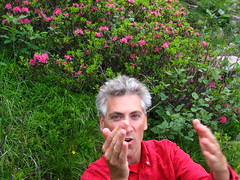Open Repositories 2009, day 1, keynote.
Locks and Gears: Digital Repositories and the Digital Commons - John Wilbanks, Vice President of Science, Creative Commons
Great presentation - in content as well in format. Worth looking at the slides [slideshare - of a similar presentation two weeks earlier]. [Which was good, because it was awkwardly scheduled at the end of the afternoon, that's great with a fresh jetlag, straight after the previous panel session without as much as a toilet break.]
The unfortunately familiar story of journals on the internet, scholars' rights eroding, which causes interlocking problems that prevent the network effect.
Choice quotes:
“20 years ago, we would have rather believed there be a worldwide web of free research knowledge, than Wikipedia.”
"The great irony is that the web was designed for scientific data, and now it works really well for porn and shoes."
The CC licenses are a way of making it happen with journals. However, for data even CC-BY is making it hard to do useful integration of different datasets. Survey of 1000 bio databases: >250 different licenses! Opposite law of open source software: the most conservative license wins.
Example of what can happen if data is set free: Proteomecommons.org: bittorent for genomes. Thanks to CC Zero.
What can we do?
Solve locally, share globally.
Use standards. And don’t fork them.
Lead by example.
Q: opinion on wolfram alfa? Or Google Squared?
A: pretty cool, doubts about scaling. It may be this or something else, rather open source than ‘magic technology’. But it’s a sign that the web is about to crack.
“The only thing that’s proven to scale is distributed networks.”
(my comment - with an estimated 500.000 servers, that is precisely what Google is...)
Wednesday, May 27, 2009
Subscribe to:
Post Comments (Atom)

No comments:
Post a Comment